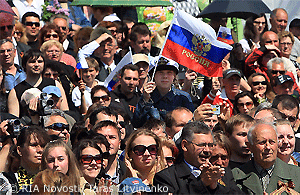Social Immobility

file photoI said last week that Russians perhaps seek out the most meritocratic nations in their emigration. I was not entirely correct, though there is certainly the perception by many that these are socially mobile countries. A couple of Public Radio stories I heard on my way to work in the following days directed me to last year's study of social mobility by the Organization for Economic Co-Operation and Development (OECD). In fact, as it turns out, the United States and Great Britain are not nearly as socially mobile that is, easy to change your economic class as are the Scandinavian countries. Canada and Australia, two of the high-latitude English-speaking countries to which I referred, still rate very highly. Canada, in particular, attracts more than its fair share of Russians. And everyone else, to be fair.
This seems to be the reality, national narratives notwithstanding, but it seems that these high-latitude English-speaking countries really are seen as lands of opportunity, even when they rate poorly amongst their peers. Russia, of course, was not included in the study, and I shudder to think of the results of an analysis of its social mobility, given the number of Russians who want to leave the country for all sorts of reasons (Russia Today even talks about this!), ranging from medical to social to existential. Some go to escape the numbing political realities in Russia, some to make money in business environments unhampered by rampant large- and small-scale corruption, and some simply because they can.
In fact, it seems that it would be hard to measure Russia's social mobility, given the rate of change in that country. So much has changed since the generation whose children are now making money were at that early stage of their lives. Since the OECD bases much of its data on the likelihood that a son will make roughly the same amount of money as his father, the former Soviet Union provides a particular challenge. The study's general findings, though, help paint a picture of Russia's situation. The conclusions include one about social safety nets, an idea unpopular amongst the sort of people who tout the policies that have defined Russia's fiscal route for the past twenty years: low corporate taxes, lax regulation, a flat income tax (since 2001), and little support for social services. According to the OECD's study, countries with robust social safety nets seem to be most socially mobile. Even countries like the United States and Britain must seem an enormous relief.
What can be done? The logistics of running programs in the largest country in the world and the seemingly inescapable and crushing weight of petty corruption makes Russia's answers different from those in most other places. There is plenty of hand-wringing in the Kremlin about the exodus of citizens, particularly well-educated ones, and proposed solutions have ranged from the laughably retrograde (sending all women home from the workforce to have babies) to the ineffectually grandiose (Skolkovo). In the end, what needs to be done is both plainly simple and mind-bendingly hard. Russia, as a country, needs to start to care for its citizens by implementing some of the sorts of social services common in Europe. I do not include in this the sort of extravagant pension systems that have brought Greece to its knees, but rather quality free healthcare, maternity/paternity leave, allowing labor unions, minimum wage. Those in the highest echelons will resist. Much money will be wasted on corruption. Fiscal libertarians will say that Russia is headed for financial ruin. The people will not trust the government's new policy and will avoid the new services or simply try to take advantage of them. But, over time, people will begin to come round.

